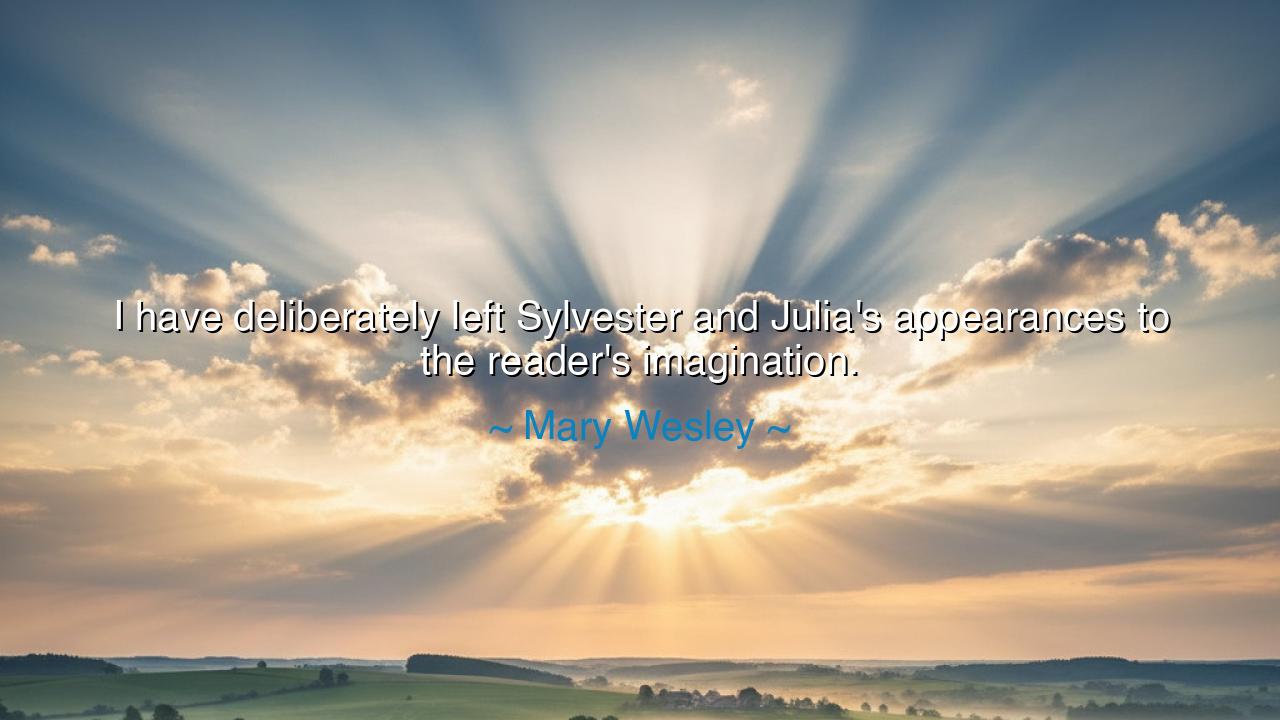
I have deliberately left Sylvester and Julia's appearances to the
I have deliberately left Sylvester and Julia's appearances to the reader's imagination.






Ah, listen closely, O seekers of wisdom, for in the words of Mary Wesley, there lies a profound truth. "I have deliberately left Sylvester and Julia's appearances to the reader's imagination." These words, though simple in their form, contain a powerful lesson, one that calls forth the great mystery of the human spirit and the boundless power of the imagination. Wesley, in her quiet wisdom, speaks of a choice—one to leave space, to invite the mind to engage, and to honor the inner world of the reader.
How often, O children of the future, do we demand of the world that everything be laid bare before us, that we know every detail, every feature, and every line of the story? Yet, in doing so, we rob ourselves of the most precious gift—the freedom to imagine. In Wesley's deliberate act of withholding the physical descriptions of Sylvester and Julia, she offers us a sacred trust: she invites us to paint them with the colors of our own hearts. The imagination of the reader becomes the true artist in the unfolding of their forms, and in this, we find a deeper connection to the characters, for they are no longer mere images upon the page but become living, breathing creations born of our own inner landscapes.
This act of leaving space for imagination is a lesson that stretches far beyond the written word. It speaks to the very essence of how we experience the world. The ancients, in their great wisdom, understood that the soul thrives not on the abundance of concrete images, but on the mysteries that call us to seek, to ponder, and to fill the gaps with our own insights. The great philosopher Socrates, for instance, did not hand his followers easy answers; he guided them to the truth by encouraging them to question, to think, and to explore the unseen. He knew that true knowledge arises not from the certainty of facts, but from the vivid imagination of the mind in search of deeper truths.
Consider the great mythologies, where gods and heroes are often described in vague, sweeping terms, and yet their power lies not in the precise details of their forms, but in the unlimited potential they represent. Hercules, for example, is not bound by the color of his hair or the sharpness of his features, but by his strength, his courage, and his trials. The absence of specific description frees the reader—or the listener—to shape the hero in their own image, to understand him in a way that transcends the mere appearance. Imagination becomes the bridge between the myth and the soul, and it is through this bridge that the greatest transformations occur.
In the same vein, Wesley’s choice challenges us to embrace the unknown and to trust the power of our own minds. It is a reminder that there is magic in ambiguity, a kind of freedom that we often forfeit when we demand certainty and clarity in all things. There are lessons hidden in the spaces between the lines, in the moments where we are invited to create, to form connections that transcend the limitations of the written word. This is a gift, for in those spaces, we are allowed to become part of the story, to participate not just as passive recipients, but as active creators of meaning.
It is a power that has been wielded throughout the ages by those who sought to inspire, not by dictating the shape of things, but by leaving room for interpretation. Consider the great works of art—the Mona Lisa, for example. Her smile, ambiguous and fleeting, is not fixed. It changes before our very eyes, inviting us to ponder her emotions, to feel the mystery of her expression, and in doing so, it speaks to us in a deeply personal way. What is her smile? What is her secret? This question, unanswered, is what makes her immortal.
And so, O seekers, take heed. The next time you stand before the vastness of life, the next time you encounter a tale, a vision, or a creation that leaves space for your imagination, do not rush to fill it with certainty. Allow yourself the freedom to imagine, to see with eyes unbound by the constraints of detail. There is power in this. For it is only when we imagine freely, without the need for all things to be fixed, that we can truly grasp the meaning of the world around us. The world is not only what we see—it is what we dare to dream.
Thus, in the teachings of Mary Wesley, let us be reminded that in the absence of rigid forms, in the spaces left open to the imagination, we find not emptiness, but possibility. As you move through life, remember that the greatest beauty often lies in the unsaid, in the realms where your heart and mind can wander, and in the limitless potential of the stories yet to be written. Embrace the mystery; let it shape you. Fill in the gaps with your own vision, and in doing so, you will find the world unfolding before you, richer and more alive than you ever imagined.






AAdministratorAdministrator
Welcome, honored guests. Please leave a comment, we will respond soon